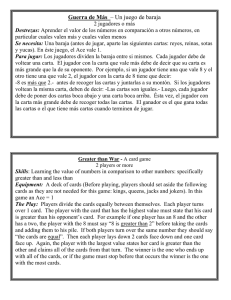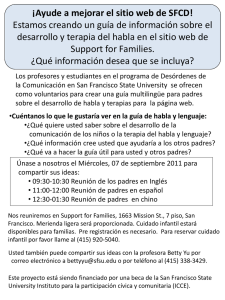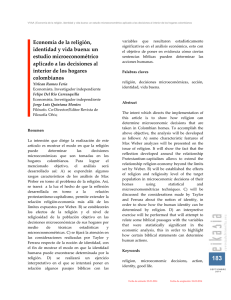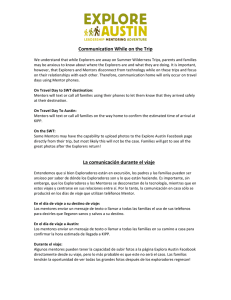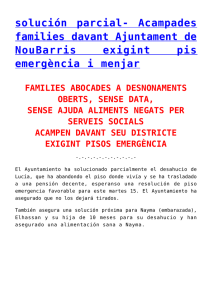Goal of the Game Game components Game dynamic happiness
Anuncio
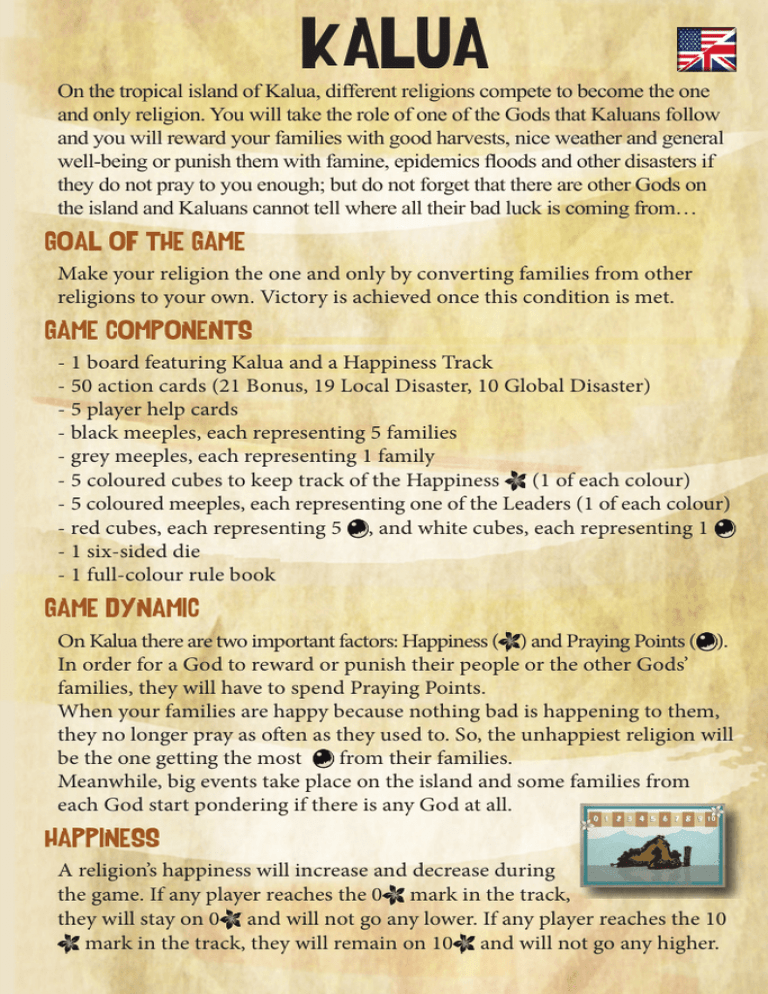
Kalua On the tropical island of Kalua, different religions compete to become the one and only religion. You will take the role of one of the Gods that Kaluans follow and you will reward your families with good harvests, nice weather and general well-being or punish them with famine, epidemics floods and other disasters if they do not pray to you enough; but do not forget that there are other Gods on the island and Kaluans cannot tell where all their bad luck is coming from… Goal of the game Make your religion the one and only by converting families from other religions to your own. Victory is achieved once this condition is met. Game components - 1 board featuring Kalua and a Happiness Track - 50 action cards (21 Bonus, 19 Local Disaster, 10 Global Disaster) - 5 player help cards - black meeples, each representing 5 families - grey meeples, each representing 1 family - 5 coloured cubes to keep track of the Happiness (1 of each colour) - 5 coloured meeples, each representing one of the Leaders (1 of each colour) - red cubes, each representing 5 , and white cubes, each representing 1 - 1 six-sided die - 1 full-colour rule book Game dynamic On Kalua there are two important factors: Happiness ( ) and Praying Points ( ). In order for a God to reward or punish their people or the other Gods’ families, they will have to spend Praying Points. When your families are happy because nothing bad is happening to them, they no longer pray as often as they used to. So, the unhappiest religion will be the one getting the most from their families. Meanwhile, big events take place on the island and some families from each God start pondering if there is any God at all. HAPPINESS A religion’s happiness will increase and decrease during the game. If any player reaches the 0 mark in the track, they will stay on 0 and will not go any lower. If any player reaches the 10 mark in the track, they will remain on 10 and will not go any higher. Initial setup Shuffle the Local and Global Disaster cards and create a disaster deck. Once finished, repeat the process with the Bonus cards to create a bonus deck. Each player draws a total of 5 action cards. You can choose from both the disaster deck and the bonus deck when drawing cards. Each player also receives 10 families, 1 leader of their colour, 5 and places their marker at the 5 mark on the track on the board. On the Kalua board, place 3 families per player, e.g. if it is a 5-player game, place 15 families. These will form the pool of atheists that can be converted to any religion. Choose a starting player randomly and play! Sequence of play 1) Draw cards: If the active player has less than 5 cards, he must draw cards until they have 5 in his hand. He can choose from both the disaster deck and the bonus deck when drawing cards. If the player already has 5 or more cards in his hand, he must only draw 1 card from a deck of their choice. 2) Activate Leader: Commencing with the active player and going clockwise, each player with a a Leader may activate it. The available actions are: a) Give a speech: Increase the by 1. b) Convert atheists: Take 2 families from the Kalua board. c) Convert believers: Take 1 family from another God. d) Give a massive speech and sacrifice himself: Remove your Leader from play and add up to 5 Families to your religion from the Kalua board. 3) Play action cards: The active player can play as many action cards as he wants, one by one. When the active player plays a card, he puts it in front of him, pays the needed by the cost symbol and puts them on top of the card. Then, each of the other players in clockwise order may be able to play 1 card of his own. Then, starting from Cost the active player, resolve all these cards in the order they were played. After a card is resolved, discard it. Effects There are 3 types of cards: 1) Bonus: You only play these cards on yourself and they give you benefits. 2) Local Disaster: They punish one specific player. The player is chosen when the card is resolved. Choosing yourself is also allowed. 3) Global Disaster: They punish everyone on the island, so it affects all the players. Its cost is 0, but can be played paying 6 or 12 . By paying 6 you will be protected from all effects. If you pay 12 you double the effects of the card but you do not get the protection. The effects of the cards can be: Praying Points that the affected religions will get due to an increase in praying. One of your families converts to atheism. Put it on the Kalua board. Happiness modifier to the affected religions. One atheist converts to your religion. Death of a family, remove it from the game. Discard a card. Keep this card on the table until used or destroyed. Recover your leader. Once the active player no longer wishes to play any more action cards, he should shout “Convert!” and phase 3 is ended. He may shout “Convert!” before playing any card. 4) Convert Families: Families will change religion according to these rules: a) If all the religions have the same happiness, nothing happens. b) The unhappiest religions will place 2 of their families into the convert pool. c) Religions that are not the unhappiest nor the happiest one will place 1 of their families into the convert pool. The convert pool is then divided as evenly as possible between the happiest religions (up to a maximum of 3 families each). If it is not possible to divide the convert pool evenly among all happiest religions, the remainder (or all of the families if too few) will go to the Kalua board as atheists. 5) Praying: At end of the turn the players will gain . All players will receive 1 for every 5 families (rounded up). Players receive no for having 0 families. In addition, the unhappiest religion will receive 4 extra and the religions that are neither the happiest nor the unhappiest will all receive 2 extra . At this point in the turn sequence, end game conditions are checked. If they are not met, the next player in clockwise order will become the active player and a new round will start. Players are allowed to draw additional cards from any deck at any time by paying 5 for each card. Special cards “Temple”: this card will remain face up in front of that player until it is destroyed by a “Temple destroyed!” card. The benefits of the temple will occur during phase 5 card (Collect ). “Amulets”: this card will remain face up in front of that player until it is used. Discard it to avoid losing any families by the effect of any one card. “New Leader”: one of your families becomes your Leader. Recover your Leader meeple and remove one of your families. Player elimination: A religion is not completely eliminated from the game until all its families have left and their Leader has self-sacrificed. For example, if a Leader has lost all of his families, he can still increase the happiness by 1 every turn by giving a moving speech. This means that if by chance that religion happens to be the happiest one, it will lure some new families and resurrect the religion once again. Do not forget that the Leader, during phase 2, can also convert 2 atheist families back to his religion or 1 believer from a different religion into his own. End Game conditions If at the end of any round (just after phase 5), there is only one religion with families left (with or without Leader), this religion will be declared the winner, even if there are other religions with only their Leader. If at any time, a new Global Disaster is played and every religion is out of families, the religion with more families before the card was played is declared the winner. If religions are tied, both players win. cRedits Designer: Carlos Moreno Illustrator: Gary Simpson Translation:: Alan Edwards & David Estall Edited by: HomoLudicus - © 2012 HomoLudicus Juegos, S.L. Acknowledgements: I would like to dedicate this game to my good old friend Billie Ciao Baroody, who gave me the push I needed to become a professional game designer. Kalua En la isla tropical de Kalua varias religiones compiten por convertirse en la única y verdadera fe del lugar. Eres uno de los cinco dioses a quienes adoran los habitantes de la isla, a los que podrás recompensar con abundantes cosechas, buen tiempo y bienestar general o bien castigarlos con hambrunas, epidemias, inundaciones y otros desastres si no te rezan lo suficiente. Un consejo, no olvides que hay otros cuatro dioses en la isla y los habitantes de Kalua no saben de dónde procede su mala suerte... objetivo Conseguir que tu religión sea la única de Kalua haciendo que los adoradores de otras religiones se conviertan a la tuya. La victoria se consigue al cumplir este objetivo. componentes - 1 tablero con la isla de Kalua y el índice de felicidad - 50 cartas de acción (21 de bonus, 19 de desastre local, 10 de desastre global) - 5 cartas de ayuda para los jugadores - peones negros (con valor de 5 familias) - peones grises (con valor de 1 familia) - 5 cubos de colores para medir la felicidad (1 de cada color) - 5 peones de colores, cada uno representando a un líder (1 de cada color) - cubos rojos (con un valor de 5 ) y cubos blancos (con un valor de 1 ) - 1 dado de seis caras - estas instrucciones , dinAmica de juego En Kalua hay 2 elementos importantes: la felicidad ( ) y los puntos de oración ( ). Para que un dios conceda beneficios o castigue a las familias de creyentes que lo adoran a él o a otras religiones, deberá gastar puntos de oración. Cuando los seguidores de un dios son felices porque nada malo les sucede, dejan de rezar con tanto fervor. Por ello, la religión más infeliz será la que consiga más de sus familias. Mientras, grandes eventos tienen lugar en Kalua y algunos creyentes comienzan a preguntarse si en efecto existen los dioses. FELICIDAD La felicidad de cada religión aumenta y disminuye a lo largo de la partida. Si algún jugador alcanza la casilla 0 en el índice de felicidad, permanecerá en ella y no descenderá más. Del mismo modo, si alcanza la casilla 10 felicidad, permanecerá en ella y no aumentará más. del índice de , PREPARACIoN Forma el mazo de desastres mezclando las cartas de desastre local y desastre global. Luego, crea el mazo de bonus barajando las cartas restantes. Cada jugador roba 5 cartas de acción, eligiendo cuántas quiere coger de cada mazo. Recibe también 10 familias, el líder de su color y 5 , tras lo que coloca su marcador de felicidad en la casilla 5 del índice de felicidad. Se colocan 3 familias por jugador en el tablero de la isla (en una partida de 5 jugadores, por ejemplo, debería haber 15 familias). Este grupo conforma la reserva de ateos que pueden convertirse a cualquier religión. ¡Elegid al azar un jugador inicial y que comience el juego! Secuencia de juego 1) Robar cartas: Si el jugador activo tiene menos de 5 cartas en la mano, roba las cartas necesarias para llegar a ese número. Para ello elige cuántas quiere coger de cada mazo. Si ya tiene 5 cartas en la mano, coge 1 del mazo que prefiera. 2) Activar el líder: Empezando por el jugador activo y siguiendo en sentido horario, cada jugador que aún tenga su líder puede activarlo. Las acciones disponibles son: a) Dar un sermón: incrementa la en 1. b) Convertir ateos: coge 2 familias del tablero. c) Convertir creyentes: coge 1 familia de otro dios. d) Hacer una aparición y autosacrificarse en público: retira tu líder del juego y añade 5 familias a tu religión cogiéndolas del tablero. 3) Jugar cartas de acción: El jugador activo puede jugar tantas cartas de acción como quiera, pero de una en una. Cuando lo haga, debe colocar la carta frente a sí y poner encima el coste de necesario para activarla (indicado por el símbolo ). A continuación, cada uno de los demás jugadores también podrá jugar una carta de acción en sentido horario. Las cartas se resuelven de una en una, comenzando por el jugador activo y Coste siguiendo el orden en el que se han jugado. Una vez Efectos resueltas, las cartas se descartan. Hay 3 tipos de cartas: 1) Bonus: solo pueden jugarse sobre uno mismo y aportan beneficios. 2) Desastre local:: castigan a un único jugador. En el momento de resolverla debe indicarse a quién, siendo posible jugarlas sobre uno mismo. 3) Desastre global:: afecta a la isla entera y tiene efecto sobre todos los jugadores. El coste para activarla es de 0, pero puede jugarse pagando 6 o 12 . Pagando 6 el jugador que la haya activado no se verá afectado, mientras que pagando 12 los efectos de la carta se duplicarán (pero quien la haya jugado no tendrá protección frente a ella). Los efectos que pueden tener las cartas son: Puntos de oración que consiguen las religiones afectadas por el aumento de oración. Una de tus familias se vuelve atea. Colócala en el tablero de la isla. Modifica la felicidad de las religiones afectadas. Uno de los ateos se convierte a tu religión. Muerte de una familia (se retira de la partida). Descarta una carta. Deja la carta sobre la mesa hasta usarla o ser destruida. Recupera tu líder. En el momento en que el jugador activo decida no jugar más cartas de acción, declara “¡Conversión!” para dar por terminada la fase 3. La conversión puede declararse antes de jugar ninguna carta. 4) Convertir familias: Las familias se convierten según las siguientes reglas: a) Si todas las religiones tienen la misma felicidad, no ocurre nada. b) Las religiones más infelices separan 2 de sus familias. c) Las religiones que no son ni las más felices ni las más infelices separan 1 de sus familias. Las familias separadas se dividen de manera equitativa entre las religiones más felices (hasta un máximo de 3 familias por religión). Si no es posible dividirlas de manera equitativa, el resto (o todas las familias, si su número es menor que el de religiones) se colocarán en el tablero como ateos. 5) Rezar: Al final del turno, los jugadores consiguen . Cada jugador recibe 1 por cada 5 familias que tenga (redondeando hacia arriba), aunque no se otorga ningún por tener 0 familias. La religión más infeliz recibirá a su vez 4 adicionales, mientras que las religiones que no sean las más felices ni las más infelices recibirán 2 adicionales. En este momento se comprueban las condiciones para terminar la partida. Si no se cumplen, el siguiente jugador en sentido horario pasa a ser el jugador activo y se da comienzo a una nueva ronda. Los jugadores pueden robar cartas adicionales de cualquier mazo cuando lo deseen pagando 5 por cada una de ellas. CARTAS ESPECIALES “Templo”: esta carta permanece boca arriba frente al jugador hasta que sea destruida por una carta “Templo destruido”. Los beneficios del Templo se obtendrán durante la fase 5 (Conseguir ). “Amuletos”: esta carta permanece boca arriba frente al jugador hasta que decida usarla. Descártala para no perder familias como efecto de una única carta. “Nuevo líder”: una de tus familias se convierte en tu nuevo líder. Recupera el peón de líder y retira del juego una de tus familias. jugadores eliminados Una religión no está completamente eliminada hasta que haya perdido todas sus familias y el líder se haya sacrificado. Por ejemplo, aunque un líder haya perdido a todos sus seguidores, aún puede incrementar su felicidad en 1 por cada turno que pase si da un sermón. Si esa religión resulta ser la más feliz, puede atraer a nuevas familias que la resuciten. No debe olvidarse que, durante la segunda fase, el líder puede convertir a su religión 2 familias ateas o 1 familia que adore a otro dios. fin de la partida Si al acabar la fase 5 solo queda una religión con familias, se declarará ganadora al margen de que que ella u otras religiones tengan o no tengan a su líder. Si en algún momento se juega un Desastre global y todas las religiones pierden a sus familias, la que tuviera más familias antes de jugarse la carta es la ganadora. En caso de empate, ambos jugadores ganan. , cREditos Autor: Carlos Moreno Ilustrador: Gary Simpson Traducción: Maite Madinabeitia Editado por: HomoLudicus - © 2012 HomoLudicus Juegos, S.L. Agradecimientos: Me gustaría dedicar este juego a mi buen amigo Billie Ciao Baroody, quien me dio el empujón necesario para dedicarme a diseñar juegos de manera profesional.
